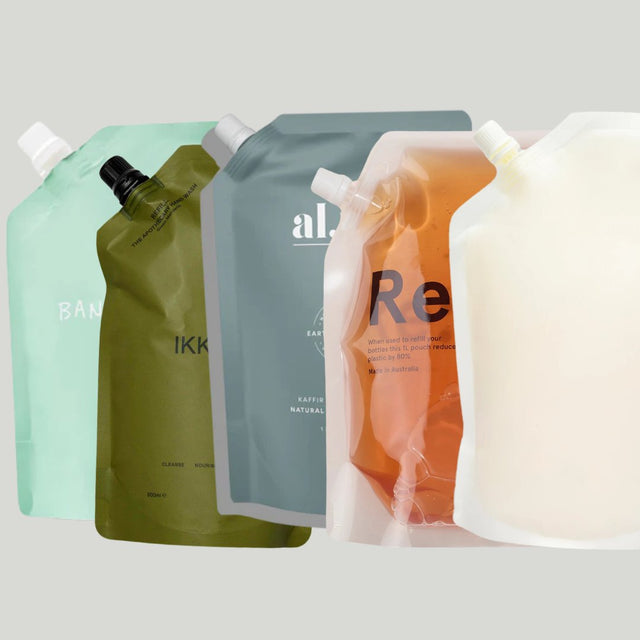The Big Problem With Refill Pouches: Why They're Not As Sustainable As You Thought
Think refill pouches are sustainable? Think again.
Refilling a plastic bottle from a plastic pouch and calling it sustainable doesn’t make much sense. Refill pouches are made from virgin plastic, which relies on petrochemicals and heavy metals for its manufacture. Globally, it’s estimated that virgin plastic manufacture contributes 14% of all greenhouse gasses and takes 8% of the world's oil. And only 9% of all plastic is recycled.
Refill pouches are also very challenging to dispose of sustainably. Any pouch that holds liquid is constructed using multiple layers of different types of plastic chemically bonded together. This makes the pouch difficult - or impossible - to recycle. Further, they use non-recyclable waterproof seals and spouts. This makes the pouch even less sustainable than the plastic bottle it’s designed to fill.
While refill pouches are touted as "reducing plastic waste", the truth is that plastic refill pouches are responsible for creating more plastic in a form that is less sustainable. Soft plastic pouches are a greenwashing exercise, not a sustainable solution to single-use plastic.
The problem with recycling plastic
In Australia we use 3.5 million tonnes of single use plastic every year. Only 9% of that plastic is recycled, while the remaining 91% ends up in landfill or discarded into our natural ecosystems where it never degrades. The plastic that does make it into the recycling system has a limited recycling lifespan and can most often only be 'down-cycled', not remade into like-for-like products.
Soft plastic is one of the most challenging types of plastic to recycle. Australians use 70 billion pieces – roughly 538,000 tonnes – of soft plastic each year, according to the Australian Packaging Covenant Organisation (APCO). Since the collapse of soft plastic recycling venture REDCycle, there are no readily accessible systems in place to recycle soft plastic in Australia.
The inability to recycle refill pouches and the lack of consumer education around their poor sustainability rating is creating a new problem, not solving an existing one. Simply, the only way to tackle the plastic crisis is to stop using plastic.
A truly sustainable refill system
The first of their kind, our refills are packaged in kerbside recyclable aluminium canisters developed with functionality, circular economy, and aesthetics in mind. Slimline and self-standing, they eliminate the pain points of messy plastic pouches while addressing the obvious sustainability issues.
Aluminium is one of the most sustainable natural resources on the planet. It is the most abundant metal in the Earth's crust, and it can be infinitely recycled, with recycling using 95% less energy than manufacturing new aluminium. Globally, 76% of all aluminium ever produced is still in use today.
Our 1-litre aluminium canisters refill our 500ml glass bottles two times. At the end of their life, they can be added to all Australian kerbside recycling collections.
This is the only truly sustainable refill product on the market – no greenwashing.

Plastic-free from end-to-end
In addition to the aluminium refills, all WØRKS products are packaged in glass, not plastic. From manufacture through to post-consumer, glass is the most sustainable option for personal care packaging.
Glass can be easily sterilised in the home to be safely refilled and repurposed. It can be recycled endlessly via every Australia kerbside recycling system without a loss of integrity, meaning there are no limitations to its recycling lifespan. Glass is manufactured from natural raw materials: silica (sand), soda ash and limestone - not oil or petrochemicals - making the process far more environmentally sound than plastic manufacture.
Should it enter our natural ecosystems, glass poses no risk of leaching toxins into soil and water. Similarly, it does not pose any risk to wildlife or marine life.



0 Comments
There are no comments for this article. Be the first one to leave a message!